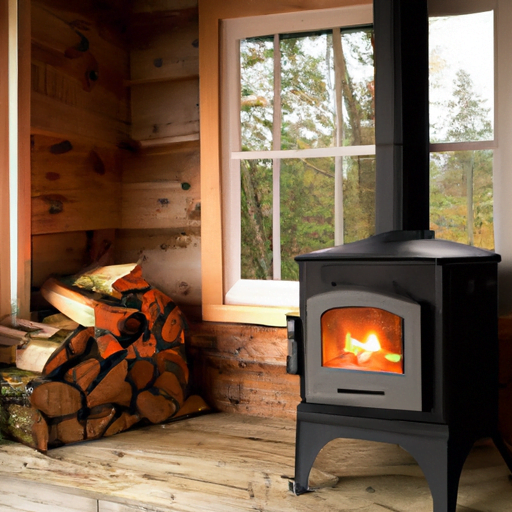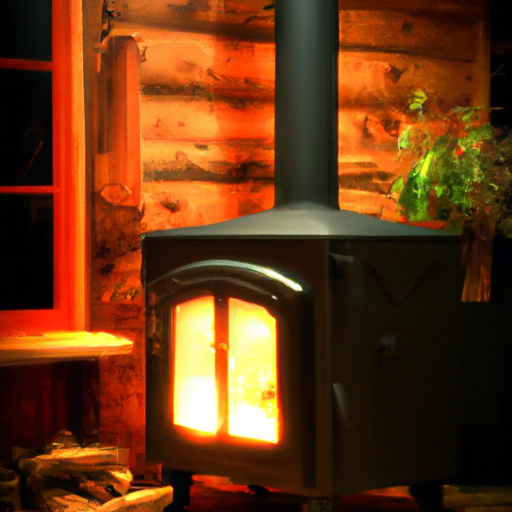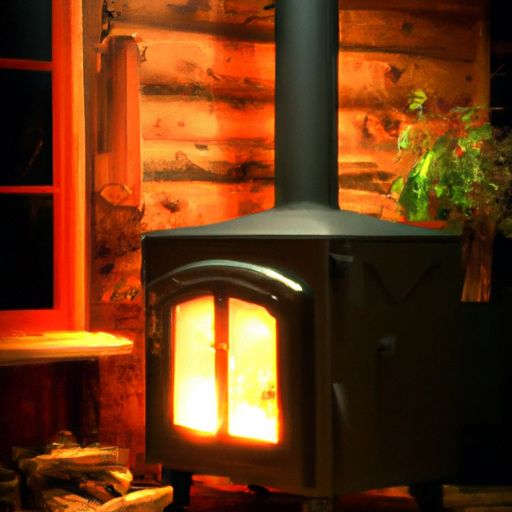So, you’ve decided to embrace the off-grid lifestyle and live in a remote area away from the convenience of modern amenities. That’s great! But now you’re faced with the challenge of heating your room without electricity. Don’t worry, there are plenty of alternative methods available that can keep you warm and cozy. In this article, we will explore some of the most popular alternative heating options for off-grid living, so you can choose the one that suits your needs best.
When it comes to heating your whole room without electricity, there are several options to consider. One popular method is using a wood-burning stove or fireplace. Not only does it provide warmth, but it also adds a touch of rustic charm to your living space. Another option is a propane heater, which is convenient and can be easily installed. Additionally, you might want to explore the possibility of using a solar heater, which utilizes the power of the sun to generate heat.
In this article, we will delve deeper into each of these alternative heating methods, discussing their pros and cons, installation process, and maintenance requirements. By the end of it, you’ll have a wealth of knowledge to help you decide which option is the best fit for your off-grid lifestyle. So, let’s get started and explore the wonderful world of alternative heating methods for off-grid living!

Alternative Heating Methods for Off-Grid Living
Introduction to Off-Grid Living
Defining Off-Grid Living
Off-grid living refers to the lifestyle in which individuals or communities choose to live independently from the traditional power grid, relying on self-sustainable energy sources instead. This means generating their own electricity, collecting rainwater, and finding alternative solutions for everyday needs. Off-grid living allows individuals to live in remote areas, away from urban settings, and embrace a more sustainable and self-sufficient lifestyle.
Advantages of Choosing Off-Grid Living
There are numerous advantages to living off-grid. Firstly, it allows for energy independence, where individuals have complete control over their energy production and consumption. By relying on renewable energy sources, off-grid living can reduce utility costs significantly. Additionally, this lifestyle choice has a reduced environmental impact, as it eliminates reliance on fossil fuels and reduces carbon emissions. Furthermore, off-grid living promotes a closer connection with nature, as individuals are surrounded by the natural beauty of their remote environment. Lastly, it encourages self-sufficiency and resilience by providing individuals with the skills and knowledge to live independently.
Examples of Off-Grid Living Environments
Off-grid living can be pursued in various environments worldwide. From cozy cabins nestled in the mountains to sustainable communities in the countryside, individuals have chosen to disconnect from the power grid and embrace a simpler, more sustainable lifestyle. Some notable examples include Earthship Biotecture in New Mexico, USA, and the Findhorn Ecovillage in Scotland, UK.
Benefits of Off-Grid Living
Energy Independence
One of the primary benefits of off-grid living is the freedom to generate your own electricity. By utilizing renewable energy sources such as solar panels, wind turbines, or hydro power, individuals can become completely self-reliant for their energy needs. This independence allows for greater control over energy usage and reduces dependence on utility companies.
Reduced Utility Costs
Living off-grid can result in significant savings on utility bills. By generating your own electricity, you can eliminate or reduce your reliance on power companies and their associated costs. This can result in long-term financial benefits and allows individuals to allocate their resources towards other essential needs.
Reduced Environmental Impact
Transitioning to off-grid living promotes a more sustainable lifestyle as it reduces reliance on fossil fuels. By utilizing renewable energy sources such as solar or wind power, individuals can significantly reduce their carbon footprint and contribute to a cleaner environment. This environmentally conscious choice helps preserve the Earth’s natural resources for future generations.
Closer Connection with Nature
Living off-grid allows individuals to immerse themselves in the beauty of nature. Away from the hustle and bustle of urban living, off-grid enthusiasts can enjoy the tranquility and serenity of their remote surroundings. This lifestyle choice offers unparalleled opportunities for outdoor activities, nature exploration, and a deep appreciation for the natural world.
Self-Sufficiency and Resilience
Off-grid living encourages self-sufficiency and resilience by providing individuals with the skills, knowledge, and resources to meet their own needs. From growing food to generating energy, individuals become less dependent on outside sources, thus increasing their sustainability and ability to adapt to changing circumstances.

Challenges of Off-Grid Living
Limited Access to Utilities
Living off-grid means being disconnected from traditional utilities such as water, electricity, and sewage systems. While this can be liberating, it also presents challenges in terms of accessing these essential resources. Individuals must find alternative solutions such as rainwater collection systems, solar power, and composting toilets to meet their basic needs.
Higher Upfront Costs
Transitioning to off-grid living often requires significant upfront costs. Investing in renewable energy systems, rainwater collection infrastructure, and other off-grid necessities can be expensive. However, these costs are often offset over time through reduced utility bills and long-term savings.
Maintenance and Upkeep
Living off-grid requires individuals to take on more responsibility for maintaining and optimizing their energy systems, water infrastructure, and other essential systems. Regular maintenance and upkeep are crucial to ensure the smooth functioning of off-grid systems and to avoid any potential issues.
Potential Lack of Amenities
Living off-grid may mean sacrificing certain modern amenities and conveniences that are readily available in urban areas. Some individuals may find it challenging to adapt to a simpler lifestyle and the absence of certain comforts. However, the benefits of off-grid living often outweigh these sacrifices for those seeking a more self-sustainable and environmentally conscious lifestyle.
Adapting to a Different Lifestyle
Transitioning to off-grid living requires individuals to adapt to a different way of life. It involves embracing a more self-sufficient and hands-on approach to daily activities. The learning curve can be steep, and individuals must be prepared to invest time and effort into acquiring new skills and knowledge.
Importance of Alternative Heating Methods
Limited or Unreliable Electricity Supply
One of the key challenges of off-grid living is the limited or unreliable electricity supply. This can be particularly challenging during the winter months when heating becomes essential. Alternative heating methods are crucial in providing a reliable source of warmth and comfort.
Preserving Comfort and Warmth
Maintaining a comfortable temperature within the living space is vital for the wellbeing and comfort of individuals in off-grid environments. Alternative heating methods ensure that individuals can stay warm and cozy, even in harsh weather conditions.
Ensuring Survival During Extreme Weather
In off-grid living, adverse weather conditions can pose a significant threat. Alternative heating methods act as a lifeline during extreme weather events, ensuring individuals can withstand freezing temperatures and stay safe and healthy.
Reducing Dependency on Fossil Fuels
By using alternative heating methods, off-grid living can reduce its dependency on fossil fuels for warmth. These methods typically rely on renewable energy sources such as solar power or biomass, minimizing the environmental impact and contributing to a greener future.
Exploring Eco-Friendly Solutions
Alternative heating methods often utilize renewable energy sources, making them eco-friendly options for off-grid living. These methods allow individuals to explore sustainable solutions for heating their living spaces while minimizing their carbon footprint.
Passive Solar Heating
Harnessing the Sun’s Energy for Heat
Passive solar heating is a method that utilizes the sun’s energy to provide warmth. It involves designing buildings and windows to maximize solar gain, capturing and storing heat naturally.
Designing Buildings and Windows for Solar Gain
Buildings designed for passive solar heating incorporate features such as large south-facing windows, thermal mass, and shading devices. These design elements optimize solar gain during the winter months, capturing and storing heat.
Utilizing Thermal Mass for Heat Storage
Thermal mass materials like concrete or stone can absorb and store heat from the sun, releasing it gradually over time. This helps regulate indoor temperatures and maintain warmth during the night or cloudy days.
Distributing Solar Heat Effectively
To distribute solar heat effectively throughout the living space, proper ventilation and airflow are essential. Natural convection or fans can help circulate the warm air, evenly distributing the heat.
Considerations and Limitations of Passive Solar Heating
Passive solar heating relies on the availability of sunlight. Cloudy or overcast days can limit the effectiveness of this method. Additionally, it requires careful design and planning to ensure optimal performance and may not be suitable for all climates.
Wood-Burning Stoves and Fireplaces
Traditional and Reliable Heating Source
Wood-burning stoves and fireplaces have been used for centuries to provide warmth and comfort. They offer a reliable heating source, regardless of electricity availability.
Choosing the Right Wood-Burning Stove
When selecting a wood-burning stove, factors such as efficiency, size, and design need to be considered. It’s essential to choose a stove that is appropriate for the size of the living space and offers efficient heat output.
Fireplace vs. Freestanding Stove
Both fireplaces and freestanding stoves have their advantages and considerations. Fireplaces offer a traditional ambiance and can provide heat to larger areas, while freestanding stoves are more energy-efficient and versatile in terms of placement.
Installation and Safety Precautions
Proper installation of wood-burning stoves or fireplaces is crucial to ensure safety and efficiency. It’s important to comply with local regulations and guidelines and to have a professional perform the installation.
Tips for Efficient Wood-Burning
To maximize the efficiency and effectiveness of wood-burning stoves or fireplaces, it’s important to use properly seasoned firewood, maintain proper airflow, and regularly clean and maintain the equipment.
Pellet Stoves
Overview of Pellet Stoves
Pellet stoves are a popular alternative heating method for off-grid living. They burn small pellets made from compressed organic matter, providing efficient and clean heat.
Advantages and Disadvantages
Pellet stoves offer several advantages, including ease of use, high efficiency, and automated fuel delivery. However, they require a constant supply of pellets and may be more expensive to operate than wood-burning stoves.
Choosing the Right Pellet Stove
When selecting a pellet stove, factors such as heat output, hopper capacity, and automation features should be considered. It’s important to choose a stove that suits the specific heating needs of the living space.
Installation and Maintenance
Proper installation and regular maintenance are essential to ensure the safe and efficient operation of pellet stoves. Professional installation and routine cleaning are recommended to avoid any potential issues.
Tips for Optimal Performance
To ensure optimal performance of pellet stoves, it’s important to use high-quality pellets, regularly clean the stove and chimney, and perform routine maintenance according to the manufacturer’s guidelines.
Propane Heaters
Understanding Propane Heating Systems
Propane heaters are a versatile heating option for off-grid living. Propane gas is burned to generate heat, providing a reliable and efficient source of warmth.
Types of Propane Heaters
There are various types of propane heaters available, including portable heaters, wall-mounted heaters, and whole-house heating systems. The choice depends on the heating needs and preferences of the individual.
Installation and Safety Considerations
Propane heaters should be installed by professionals to ensure proper ventilation and safe operation. It’s crucial to follow safety guidelines, such as regular inspections and proper storage and handling of propane tanks.
Advantages and Limitations
Propane heaters offer advantages such as portability, instant heat, and reliable operation. However, they require a constant supply of propane and can be more expensive to operate compared to other heating methods.
Keeping a Reliable Propane Supply
Maintaining a reliable propane supply is essential for uninterrupted heat in off-grid living. Regularly monitoring propane levels, having backup tanks, and establishing a relationship with a reliable supplier are key considerations.
Conclusion
Summary of Alternative Heating Methods
Off-grid living presents unique challenges, particularly when it comes to heating. Alternative heating methods such as passive solar heating, wood-burning stoves, pellet stoves, and propane heaters offer reliable solutions for off-grid heating needs.
Choosing the Right Method for Your Off-Grid Living
The choice of heating method depends on various factors, including climate, available resources, and personal preferences. It’s essential to assess individual needs and consider the advantages and limitations of each option.
Combining Multiple Heating Systems
In some cases, combining multiple heating systems may provide the best solution for off-grid living. This approach maximizes efficiency, ensures versatility, and provides backup options in case of equipment failures or fuel shortages.
Future Developments in Off-Grid Heating
As technology continues to evolve, new and innovative heating solutions for off-grid living are likely to emerge. Advancements in renewable energy and energy storage may offer even more sustainable and efficient alternatives for off-grid heating.
In conclusion, off-grid living offers individuals the opportunity to embrace a sustainable, self-sufficient lifestyle. Alternative heating methods play a crucial role in ensuring warmth, comfort, and survival in off-grid environments. By utilizing passive solar heating, wood-burning stoves, pellet stoves, or propane heaters, individuals can maintain a cozy living space while reducing their reliance on traditional energy sources. As off-grid living continues to gain popularity, it is important to explore and develop further innovative solutions for reliable and eco-friendly off-grid heating.





